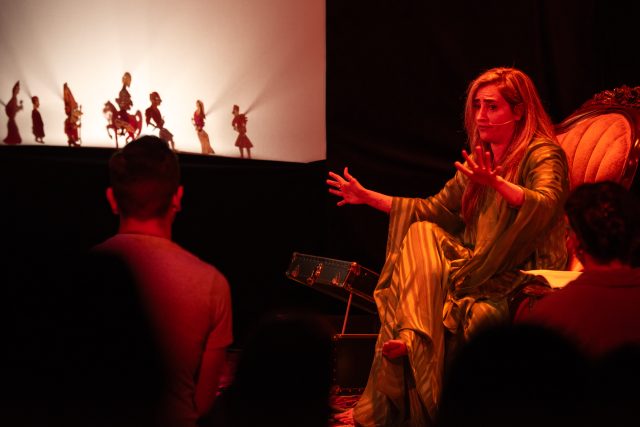[ad_1]
The Center for Armenian Studies celebrated an evening of cultural enrichment on Saturday as producer and narrator Sona Tatoyan and actor Ayhan Hülagü used shadow puppetry and narration to share the art of Karagöz in their show “Azad Storytelling: Interactive Karagoz Puppetry Experience” at the Keene Theater.
The event drew a full house and featured a carefully decorated set with candles and authentic handmade rugs from Hagopian World of Rugs, some dating back more than a century. The show itself involves the ancient technique of Karagöz, a form of shadow puppetry that originated in the Ottoman Empire.
Vicken Mouradian, academic program coordinator at CAS and event coordinator, said he was proud of how the event turned out in an email to The Michigan Daily.
“Our center has been on campus for over 40 years, yet I still hear, ‘We didn’t know this center even existed before we heard about this event!’” Mouradian wrote. “Unlike many other units, we’re entirely community-funded, which is what impresses me most — it’s the community that really supports this work.”
CAS Director Gottfried Hagen said the center has recently shifted focus toward artistic shows rather than academic-focused events in an interview with The Daily.
“In the last couple of years, we have done quite a few events with artistic content more than academic,” Hagen said. “For example, two years ago, we had a major music ensemble from Armenia, as well as Armenian filmmakers. So, there’s a network built through which we stay connected with culture-based arts like this, and once we heard about the astounding story behind this show, we thought that this is absolutely something we want to bring to a larger audience.”
The show featured Tatoyan, who founded her nonprofit organization, Hakawati, to preserve the ancient art of Armenian storytelling. She stated in her performance that she was inspired by the puppets in her family home in Aleppo, once belonging to her great-great grandfather. Tatoyan’s storytelling explored themes such as her trauma from the Armenian genocide and the Syrian war and how to heal that trauma through art.
She opened the show by speaking to the puppets, which were controlled by Hülagü, saying that these puppets had called her to Aleppo to uncover her generational history through storytelling.
Following her introduction, much of the show was spoken word performance from Tatoyan, then accompanied by visual representation from the puppets. In one portion of the show, she retells part of the popular tale “A Thousand and One Nights,” using the puppets. The story features a king betrayed by the infidelity of his wife, who is eventually healed through the power of storytelling.
Tatoyan then connected the story of the king to her own life. This connection was used to encourage the audience to acknowledge their own trauma and use art to heal themselves, Tatoyan told The Daily.
“The more specific we are with our own experiences, the more universal it becomes because we are all the same,” Tatoyan said. “We feel the same things, we want the same things, we need the same things. I noticed when you’re able to share your heart in that way, it opens the door for other people to do the same.”
Following the performance, a Q&A session inspired many attendees to share their own experiences, reflecting how deeply the show resonated with audience emotion.
Rackham student Isabelle Kinney, said in an interview with The Daily that the event felt personal and authentic.
“I thought it was remarkable how sincere the show was,” Kinney said. “When you’re talking about subjects as heavy as the Armenian genocide or the Syrian war, it is easy to depersonalize it. However, she really stuck to the authenticity of her narrative, and it was incredibly human and clear that she was so present in the things that she was feeling and talking about.”
Hagen said he believed the event provided a space to discuss and learn about Armenian culture.
“There’s two aspects to the impacts that these kinds of events have,” Hagen said. “One of them is addressing the Armenian community and the way that they think about their heritage and identity, and there is also addressing a larger public and educating them about Armenian culture and history.”
Tatoyan said she was excited to connect with students and staff at the University.
“It’s thrilling and exciting to be able to present to people who are human and young and want to see change in the world,” Tatoyan added. “I’m a big fat nerd, so to be back at universities and sharing this story and seeing how it moves people is truly my happy place.”
Daily Staff Reporter Anna Pierson can be reached at annapie@umich.edu.
Related articles
[ad_2]
Source link











